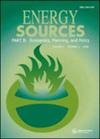深度学习与经典时间序列方法在COVID-19大流行期间天然气需求预测中的对比分析
IF 2.2
4区 工程技术
Q3 ENERGY & FUELS
Energy Sources Part B-Economics Planning and Policy
Pub Date : 2023-08-01
DOI:10.1080/15567249.2023.2241455
引用次数: 0
摘要
本文章由计算机程序翻译,如有差异,请以英文原文为准。
Comparative analysis of deep learning and classical time series methods to forecast natural gas demand during COVID-19 pandemic
ABSTRACT The lockdown measures implemented to contain the COVID-19 pandemic have had a considerable effect on the consumption of natural gas, which is closely linked to the economic growth of countries. Accurately forecasting natural gas demand is critical for making informed decisions in unprecedented and unexpected situations. This study aims to compare artificial learning-based algorithms and classical statistical time series models in predicting natural gas demand during the pandemic, using Turkey as a case study. Common time series prediction methods, including Autoregressive Integrated Moving Average (ARIMA), Nonlinear Autoregression Neural Network (NARNN), Support Vector Regression (SVR), and Long Short-Term Memory (LSTM), were utilized for this purpose. The impact of the pandemic on natural gas demand was analyzed by including 2-year natural gas consumption data since its onset. Root mean square error (RMSE), correlation coefficient (R), and mean absolute error (MAE) criteria were used as performance evaluation metrics to select the best model. The results confirmed that the deep-learning-based LSTM model provided better prediction accuracy than time-series benchmark models, with the lowest RMSE (9.442) and the highest R (0.997) values in the test dataset. Furthermore, the results were validated by statistical analysis using the Diebold-Mariano and Nemenyi tests.
求助全文
通过发布文献求助,成功后即可免费获取论文全文。
去求助
来源期刊

Energy Sources Part B-Economics Planning and Policy
ENERGY & FUELS-
CiteScore
6.80
自引率
12.80%
发文量
42
审稿时长
6-12 weeks
期刊介绍:
12 issues per year
Abstracted and/or indexed in: Applied Science & Technology Index; API Abstracts/Literature; Automatic Subject Index Citation; BIOSIS Previews; Cabell’s Directory of Publishing Opportunities in Economics and Finance; Chemical Abstracts; CSA Aquatic Science & Fisheries Abstracts; CSA Environmental Sciences & Pollution Management Database; CSA Pollution Abstracts; Current Contents/Engineering, Technology & Applied Sciences; Directory of Industry Data Sources; Economic Abstracts; Electrical and Electronics Abstracts; Energy Information Abstracts; Energy Research Abstracts; Engineering Index Monthly; Environmental Abstracts; Environmental Periodicals Bibliography (EPB); International Abstracts in Operations Research; Operations/Research/Management Science Abstracts; Petroleum Abstracts; Physikalische Berichte; and Science Citation Index.
Taylor & Francis make every effort to ensure the accuracy of all the information (the "Content") contained in our publications. However, Taylor & Francis, our agents, and our licensors make no representations or warranties whatsoever as to the accuracy, completeness, or suitability for any purpose of the Content. Any opinions and views expressed in this publication are the opinions and views of the authors, and are not the views of or endorsed by Taylor & Francis. The accuracy of the Content should not be relied upon and should be independently verified with primary sources of information. Taylor & Francis shall not be liable for any losses, actions, claims, proceedings, demands, costs, expenses, damages, and other liabilities whatsoever or howsoever caused arising directly or indirectly in connection with, in relation to, or arising out of the use of the Content. Terms & Conditions of access and use can be found at http://www.tandfonline.com/page/terms-and-conditions .
 求助内容:
求助内容: 应助结果提醒方式:
应助结果提醒方式:


